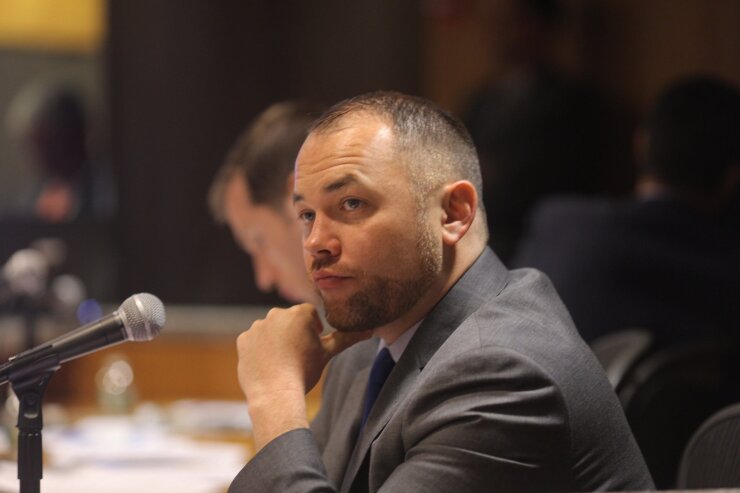New York City Council Speaker Corey Johnson on Tuesday proposed a municipal takeover of mass-transit operations within the five boroughs from the state-run Metropolitan Transportation Authority.
"State control is not working," Johnson told an overflow crowd during his State of the City address at LaGuardia Community College in Long Island City, Queens.

Johnson's comments, outlined in a 104-page report called
The state legislature would have to approve the proposal, which would feature a new agency called Big Apple Transit.
"I see too many questions for this to work right now," said Howard Cure, director of municipal bond research for Evercore Wealth Management. "A lot of this requires the state to pass off to the city control of taxing authority and construction, and I don't see that happening."
Cure cited logistical problems related to debt transfer and subsidies related to transit and commuter rail revenue.
Johnson assailed the MTA, one of the largest municipal issuers with roughly $41 billion in debt, calling it a "Frankenstein's monster."
According to Johnson, recent tax-law changes require keeping the MTA around long enough to finish servicing its current debt.
Fares, tolls and certain dedicated taxes would first flow through the legacy MTA to service that debt before flowing back to Big Apple Transit and Long Island and Metro-North commuter railroads. BAT and the railroads, not the MTA, would issue bonds. That, said Johnson, would assure that existing MTA debt "will be responsibly addressed," while freeing the new system to make capital improvements.
Johnson's analysis assumes the MTA would continue to issue the roughly $12 billion of debt to close out the MTA's current 2015-2019 capital plan, while the new authority would issue subsequent borrowing.
"We would also expect any revenue pledged directly to BAT, combined with any remaining MTA-pledged revenue, to fund BAT's operating budget and service its debt," the report said.
This arrangement, he said, cited the need for sufficient new funding sources. "Without this, the new authority's credit rating would suffer and borrowing costs would grow," said Johnson.
Capital spending would fall under the purview of the city's capital plan. The mayor would be accountable for BAT, with a dedicated deputy mayor also responsible for oversight. A new board, said Johnson, could reflect interests of transit riders rather than business professionals.
"Transit is the lifeblood of New York City and it is in crisis," Johnson said. "Our economy lives and dies on how people move around."
Gov. Andrew Cuomo's response was predictable.
“The city already owns the New York City transit system," said his communications director, Dani Lever.
Under MTA bylaws, the governor picks the MTA chairman and controls a plurality of board seats. Cuomo in the past three years has extended his influence on the authority and last week called for further tightening his grip through the creation of an uber-oversight board and aligning MTA board appointments to match political terms.
By contrast, New York's mayor controls but four of the 17 MTA board seats.
One exception to recent state control was the bond-financed extension of the No. 7 westward from Times Square to Hudson Yards, which Mayor Michael Bloomberg's administration coordinated.
Johnson also implored state lawmakers in Albany to pass a congestion pricing plan for Manhattan, which Cuomo and Mayor Bill de Blasio have jointly endorsed. "If Albany does not approve congestion pricing, the City Council will," Johnson said.
Gov. Nelson Rockefeller and Mayor John Lindsay bickered over control of the authority in the 1960s, with Rockefeller prevailing and unifying separate subway systems under the state-run MTA in 1968.
Rockefeller took over the Triborough Bridge and Tunnel Authority, with its toll and bridge money backstopping subway financing. It also marked the end of the long career of city uber-commissioner Robert Moses.
Originally, the subway was privately owned. The city opened its own IND line opened in 1932, and under Mayor Fiorello LaGuardia, assumed control of the entire system in 1940. In 1953, the subways were ceded to a new entity, the New York City Transit Authority, now an MTA unit.





